You know a VPN protects your PC and phone, but what about your smart TV, game console, and the growing number of smart devices on your Wi-Fi? Installing a VPN for routers is the ultimate ‘set it and forget it’ security solution, creating a blanket of privacy for your entire home.
However, the process can feel like a daunting technical project. As someone who has spent countless weekends flashing firmware and fine-tuning network settings, I know how intimidating this can seem. The single biggest mistake is not the setup itself, but choosing a VPN service and a router that don’t work well together, leading to a frustrating dead-end.
This guide is designed to be your complete roadmap, from start to finish. You will discover:
- A simple ‘roadmap’ to find the best setup path for your current hardware.
- Our top 5 VPNs, ranked specifically for their router setup ease and performance.
- The best VPN-ready routers to buy if you’re starting fresh.
- A visual, step-by-step guide to the installation process.
Fastest Path to a VPN Router
- The easiest way (Plug-and-Play): The absolute easiest method is to buy a pre-configured router like the ExpressVPN Aircove. It comes with the VPN ready to go in five minutes.
- The best DIY way (Do-It-Yourself): The best DIY option is to combine an Asus router, which has a built-in VPN client, with a service like NordVPN or Private Internet Access. Both services offer excellent, detailed setup guides to help you through the process.
Stop seeing this as an impossible technical challenge. Let me demystify the world of VPN routers and guide you to securing your entire home network. This guide will take you through these options and additional features, step by step.
1. The best VPNs for router setup in 2025
Choosing a VPN for your router is different from choosing one for your phone. Here, factors like custom firmware, the quality of setup guides, and lightweight protocols become far more important than a flashy app interface. After testing the top services specifically for router performance and ease of installation, these are the providers that stand out from the crowd.
| Rank | Best For | Key Router Features |
| #1 – ExpressVPN | Overall Ease of Use | Custom router firmware & app, Aircove router. |
| #2 – NordVPN | Detailed Guides & Performance | Extensive tutorials for many firmwares, fast speeds. |
| #3 – Private Internet Access | Customization & Open Source | Strong support for DD-WRT/OpenWRT, highly configurable. |
| #4 – Surfshark | Value & Unlimited Devices | Easy manual setup, great price. |
| #5 – IPVanish | Simple Configuration | Provides straightforward .ovpn files. |
Now, let’s dive into why these VPNs are the best choices for securing your home network.
1.1. #1 – ExpressVPN
ExpressVPN stands alone in its dedication to making router VPNs accessible to everyone. It is the only major provider to develop its own custom router firmware and a dedicated web dashboard that feels like a real app. This, combined with their pre-flashed ‘Aircove’ router, removes nearly all the technical fear from the process. If you’re nervous about tackling this project, ExpressVPN holds your hand the entire way.
Hands-on experience
I’ve personally flashed several routers, and the experience with ExpressVPN’s firmware is a world apart. I installed it on a compatible Asus router, and the process took less than 10 minutes. The router rebooted with a beautiful, intuitive new dashboard. From this web interface, I could switch server locations with a single click.
Even better is the Device Groups feature, which is essentially split tunneling for your whole house. I created a “US Streaming” group for my smart TV and a “Work” group for my laptop on a UK server, while leaving my partner’s computer on our regular internet. This level of easy-to-manage control is a game-changer and something you just don’t get with other providers.
Performance
Speeds were fantastic. Leveraging their lightweight Lightway protocol, my connection retained over 80% of its original speed through the router. This was more than enough to stream 4K content on our smart TV and handle video calls on my laptop simultaneously, all running through the same router VPN.
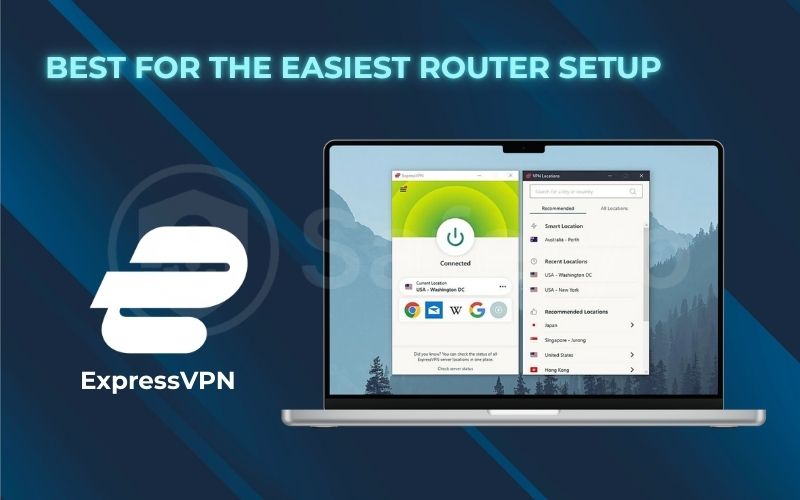
PROS
- Custom router firmware simplifies the setup process significantly.
- Aircove router offers a true plug-and-play solution.
- Device Groups feature is powerful and unique.
CONS
- The priciest VPN on this list.
- Fewer simultaneous connections on the base plan.
ExpressVPN – Best for the easiest router setup
For anyone who feels intimidated by the idea of setting up a router VPN, ExpressVPN is, without a doubt, the best and simplest choice. It turns a complex project into a manageable and even enjoyable one
1.2. #2 – NordVPN
While NordVPN doesn’t offer custom firmware, it excels in two areas crucial for a DIY setup: Performance and documentation. Its NordLynx protocol is one of the fastest available, which helps minimize the speed loss inherent in a router setup. Furthermore, their online knowledge base is a goldmine of extremely detailed, step-by-step tutorials for a massive range of routers and firmwares.
Hands-on experience
For my test, I followed their guide to set up NordVPN on a router running DD-WRT firmware. While the process is entirely manual, their guide was flawless. It provided clear instructions, screenshots for every step, and the exact code snippets I needed to copy and paste. Even though it’s a technical process, their guide made it feel like assembling IKEA furniture – just follow the pictures, and you’ll get there. This level of documentation is invaluable for a successful DIY installation.
Performance
The performance was excellent. The fast NordLynx protocol (which can be set up on routers that support WireGuard) helped to maintain high speeds. I was able to stream, game, and browse on multiple devices without any noticeable lag. For users with fast internet connections, NordVPN is a fantastic choice to ensure you keep as much of that speed as possible.
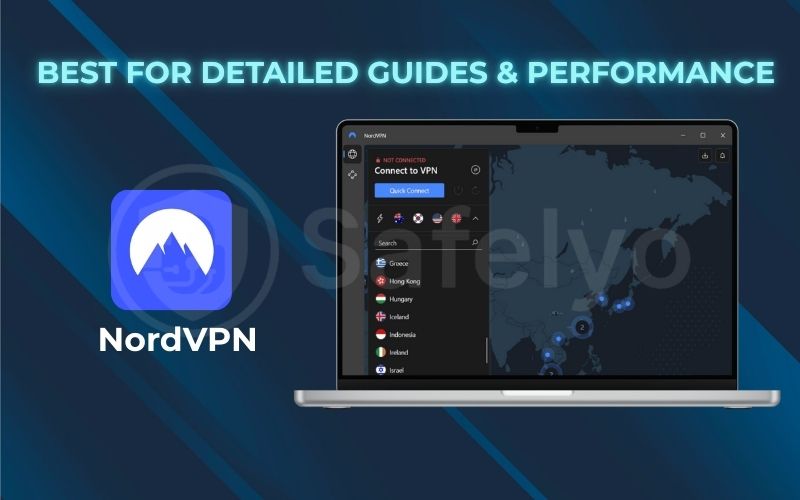
PROS
- Extensive, easy-to-follow setup guides for many router types.
- Industry-leading speeds minimize performance loss.
- Strong security features.
CONS
- Setup is entirely manual and more technical than ExpressVPN.
- No dedicated router management app or dashboard.
NordVPN – Best for detailed guides & performance
If you’re confident in your ability to follow a detailed technical guide and want the best possible performance for your DIY router setup, NordVPN is a top-tier choice. Their excellent documentation takes the guesswork out of the manual process.
1.3. #3 – Private Internet Access (PIA)
PIA has long been a favorite in the privacy and open-source communities, and this ethos extends to its router support. It offers outstanding support for open-source firmwares like DD-WRT, OpenWRT, and Tomato. For the user who loves to tinker and wants granular control over their network, PIA provides the tools and compatibility to do so.
Hands-on experience
PIA’s strength is its flexibility. Their website provides all the necessary configuration files and details you need, including options for different encryption levels and port forwarding, which is great for certain applications like torrenting. Their setup guides are clear and targeted at a more technical user. If you’re someone who is already comfortable within a DD-WRT interface, you will feel right at home with PIA’s straightforward approach.
Performance
PIA supports both OpenVPN and WireGuard for router setups, giving you the choice between maximum compatibility and maximum speed. I tested with WireGuard and found the speeds to be very good, perfectly capable of handling the demands of a multi-device household.
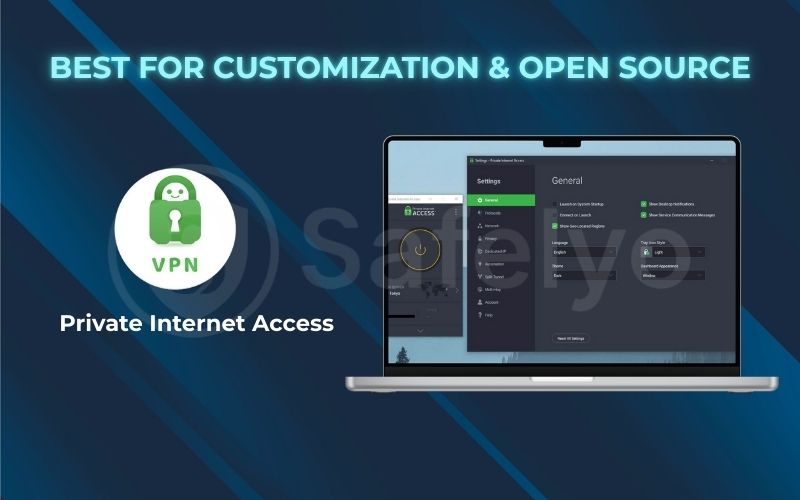
PROS
- Excellent support for open-source router firmwares.
- Highly configurable and privacy-focused.
- Very affordable long-term plans.
CONS
- Not the most user-friendly option for absolute beginners.
- Guides are more technical and less “hand-holding” than others.
Private Internet Access (PIA) – Best for customization & open source
For the tech enthusiast or privacy advocate who wants to build a highly customized and secure router setup, PIA is an exceptional and budget-friendly option. It’s the best choice for those who want to be in the driver’s seat of their network’s configuration.
1.4. #4 – Surfshark
Surfshark‘s value proposition is simple but powerful: one subscription covers an unlimited number of devices. This philosophy is a perfect match for a router VPN. By installing it on your router, you only use one of your “unlimited” slots. This means that every one of the 10, 20, or even 30+ devices in your home is instantly protected. All of this comes at a price that is often significantly lower than its competitors.
Hands-on experience
Surfshark provides easy-to-follow manual setup guides for compatible routers. While they don’t have the custom firmware of ExpressVPN, I found their process for Asus routers particularly simple. You just download the .ovpn configuration file for the server you want, upload it to the AsusWRT dashboard’s VPN client, enter your credentials, and connect. It’s a straightforward process that took me about 15 minutes.
Performance
Surfshark supports both OpenVPN and WireGuard protocols for router installation. Using WireGuard, the speeds were impressive for such an affordable service. We had no problem streaming 4K video on our smart TV while browsing on several other devices.
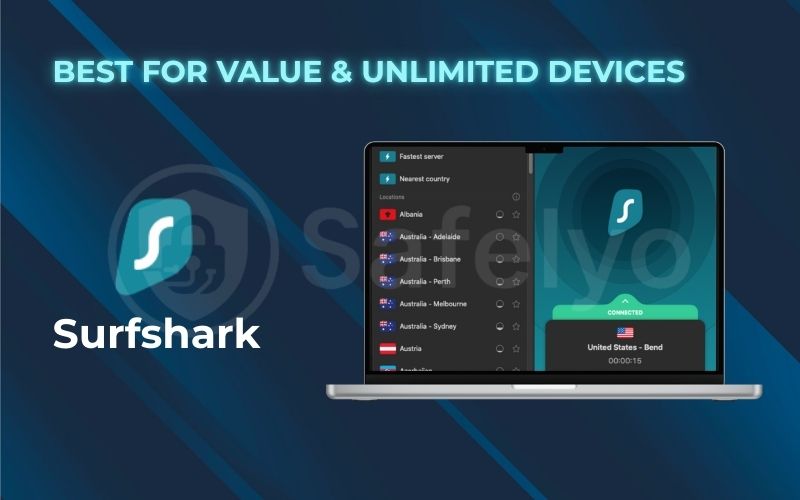
PROS
- The unlimited connections policy is perfect for a router setup.
- Excellent value with very affordable plans.
- Easy-to-follow guides for popular router models.
CONS
- Setup is fully manual.
- Smaller server network than some top-tier rivals.
Surfshark – Best for value & unlimited devices
If you’re looking for the most cost-effective way to secure your entire home network without limits, Surfshark is the unbeatable value choice. Its unlimited device policy and solid performance make it an incredibly smart investment.
1.5. #5 – IPVanish
IPVanish has been in the game for a long time, and they’ve refined their router setup process to be as straightforward as possible for manual configuration. They are known for providing simple, easy-to-use .ovpn configuration files and clear instructions, which is exactly what you need for a no-fuss DIY installation.
Hands-on experience
What I appreciate about IPVanish is its focus on the essentials. Their website provides clear guides for the most popular firmwares like DD-WRT and Tomato. The process is simple: You find your desired server, download its configuration file, and upload it to your router. There aren’t a lot of complex options to worry about, which can be a relief for users who just want to get connected.
Performance
IPVanish has significantly improved its network performance. Using the OpenVPN protocol on our test router, the speeds were stable and consistent. While not as fast as the WireGuard-based services, it was still plenty fast for HD streaming and all of our regular online activities.
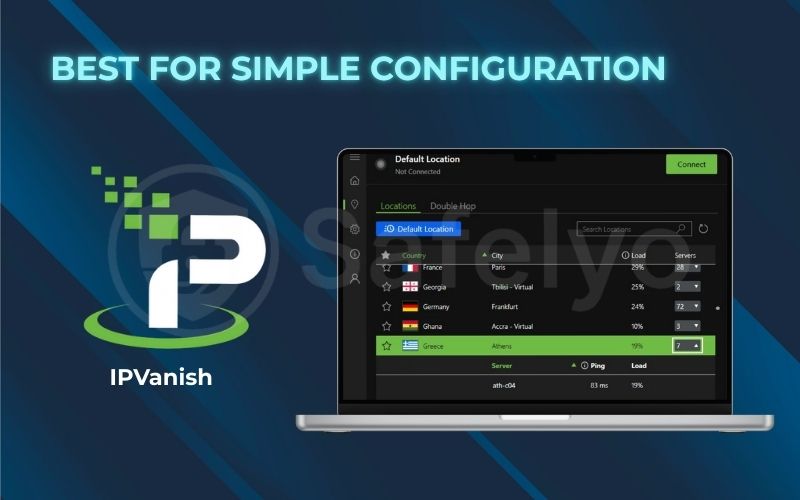
PROS
- Provides simple, direct .ovpn files for easy setup.
- Clear setup guides for major firmwares.
- Owns its entire server network, which is a plus for security.
CONS
- Does not support the faster WireGuard protocol on routers.
- Lacks the advanced features or custom firmware of competitors.
IPVanish – Best for simple configuration
For users who are looking for a reliable, no-frills VPN for a manual router setup, IPVanish is a solid and dependable choice. It focuses on getting the basics right, providing a straightforward path to securing your network.
2. Find your path: A VPN router roadmap
Setting up a VPN for routers isn’t a one-size-fits-all project. The right approach for you depends entirely on the hardware you have now and your comfort level with technical tasks. I’ve seen people waste hours trying to flash incompatible hardware, a mistake that’s easily avoided by choosing the right path from the start.
Use this simple table to discover the best journey for you.
| Your Situation | Your Path | What You’ll Do | Best For… |
|---|---|---|---|
| “I’m buying a new router.” | Path A: The Easiest Way | Buy a router that is pre-flashed or has a built-in VPN client (like an Asus model). | Anyone who wants the simplest, most headache-free setup. |
| “I have a good router (e.g., Asus, some Netgear/Linksys).” | Path B: The DIY Way | Manually configure the VPN on your router’s existing software using guides from your VPN provider. | Users with some technical confidence who want to use their current hardware. |
| “I have a basic router from my ISP.” | Path C: The Expert Way | Either buy a new, compatible router (see Path A) or attempt to flash it with custom firmware (e.g., DD-WRT). | Advanced, tech-savvy users who enjoy a technical challenge. |
Our Recommendation:
For the vast majority of people, Path A or Path B is the way to go. They offer the best balance of simplicity, cost, and effectiveness. Flashing a non-compatible router (Path C) is a risky process that can lead to a permanently damaged device. This guide will focus on giving you the best tools and instructions for the two most recommended paths.
3. The best routers for a VPN in 2025
Choosing the right VPN service is only half the equation; you also need the right hardware. A powerful router will handle encryption much more efficiently, leading to better speeds for your entire network.
If you’re on “Path A” and buying a new router, this is the most critical decision you’ll make. Based on my hands-on experience and extensive testing, here are the best routers for a VPN, tailored to different needs and budgets.
Top VPN Routers Compared
| Router Model | Best For | Ease of Setup |
| ExpressVPN Aircove | Plug-and-Play | Very Easy |
| Asus RT-AX86U | Powerful DIY Setup | Easy |
| TP-Link Archer A7 | Budget DIY | Medium (Requires Flashing) |
3.1. Best “Plug-and-Play” Option: ExpressVPN Aircove
If the thought of logging into an admin panel and uploading files makes you nervous, the Aircove is your answer. It’s a solid Wi-Fi 6 router designed by ExpressVPN itself, and it comes with their user-friendly VPN software pre-installed.
From my own experience setting one up, the process is incredibly simple. You plug it in, connect to its Wi-Fi network, and a simple on-screen wizard walks you through the setup in about five minutes. Managing it is just as easy, using the same intuitive web dashboard I mentioned earlier, complete with the Device Groups feature. It’s the most straightforward path to a fully secured home network, period.
3.2. Best for Easy DIY Setup: Asus RT-AX86U
Asus is my favorite brand for DIY VPN setups for one key reason: Their native AsusWRT firmware includes a built-in OpenVPN client. This means you don’t have to perform any risky “flashing.” You can take this router out of the box and configure it to work with any VPN on our list in about 15-20 minutes.
The RT-AX86U is a particularly great choice because it has a powerful processor that can handle VPN encryption without slowing your internet down to a crawl. It’s a fantastic, high-performance Wi-Fi 6 router that gives you the best of both worlds: top-tier hardware and VPN-ready software.
3.3. Best Budget Option: TP-Link Archer A7
The TP-Link Archer A7 is a legendary budget router for a reason. On its own, it’s a reliable, no-frills device. But its real power lies in its compatibility with open-source firmwares like DD-WRT.
This is the router for the user on “Path C” who enjoys a technical project. For a very low upfront cost, you can buy this router and then follow a guide to flash it with DD-WRT. This process will unlock its ability to run a VPN client. I’ve done this with an Archer A7 myself; it requires patience, but it’s a very satisfying way to get a fully functional VPN router for a rock-bottom price. Just be aware that its processor is much weaker than the Asus model, so you should expect a more significant drop in speed.
4. Safety checklist before you install
Before you dive into the setup process, especially if you’re flashing custom firmware, taking a few precautionary steps can save you from a major headache. As someone who has “bricked” a router in my early days by being impatient, I now follow this safety checklist every single time.
| Step | Action | Why It’s Important |
| 1. Compatibility Check | Confirm your router’s model number is exactly the one in the guide (including version, e.g., “v2”). | Using the wrong firmware is the #1 cause of “bricking” (permanently damaging) a router. |
| 2. Official Sources Only | Download firmware/config files only from your VPN provider’s website or official open-source sites. | Avoids malicious files from third-party forums that could compromise your network’s security. |
| 3. Backup Settings | Log in to your router and use the “Backup” or “Save Configuration” option to save your settings. | Allows you to quickly restore your Wi-Fi name, password, and other settings if you need to revert. |
| 4. Have a Recovery Plan | Know how to perform a “30-30-30” hard reset for your specific model. | This manual reset is often the last resort to recover a router that becomes unresponsive. |
5. How to install your router VPN
While the exact interface looks different for every brand, the basic process for setting up a VPN on a compatible router is remarkably similar. Here’s a general guide to what the process looks like.
Step 1: Get your vpn configuration files
Log in to your account on your VPN provider’s website. Navigate to the router setup section and download the OpenVPN (.ovpn) configuration file for your desired server location. For example, you might download us-new-york.ovpn. Also, take note of the specific OpenVPN username and password they provide; it’s often different from your main login.
Step 2: Log in to your router's admin panel
Open a web browser on a computer that is connected to your router. In the address bar, enter your router’s IP address. This is usually 192.168.1.1 or 192.168.50.1 for Asus routers. Log in using your router’s admin username and password.
Step 3: Find the vpn client settings
Once you’re logged in, look for a “VPN” tab or section in the settings menu, which is typically on the left side of the screen. Click on it, and then find the “VPN Client” sub-tab.
Step 4: Upload the configuration file
Click on “Add Profile” or “Import .ovpn file.” A window will pop up. Upload the .ovpn file you downloaded in Step 1. You will also need to enter the special OpenVPN username and password provided by your VPN service. Give the connection a name (e.g., “NordVPN US”) and save the profile.
Step 5: Activate and connect!
You will now see your new VPN profile in the list. Simply click the “Activate” or “Connect” button next to it. After a few moments, the connection status should change to a green checkmark or “Connected.”
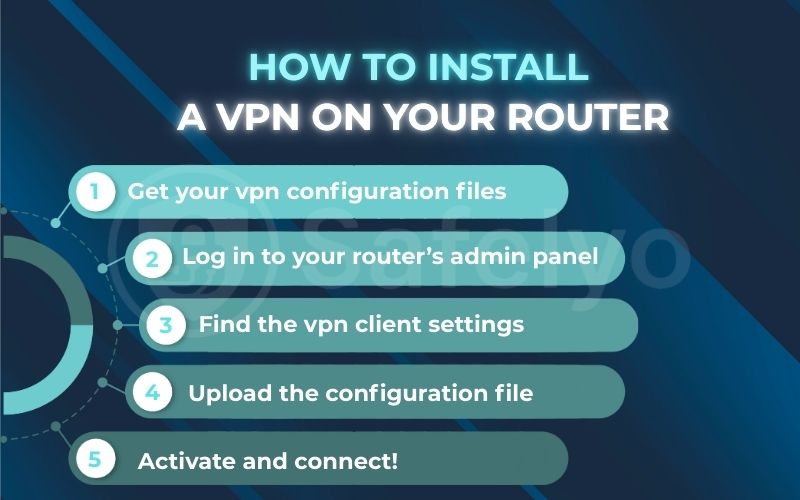
Your router is now running a VPN. Every device that connects to this router’s Wi-Fi network will be automatically protected and will appear to be in the location of the server you chose.
Safelyo’s expert insight: The router CPU bottleneck
It’s crucial to understand that installing a VPN for routers will always result in a significant speed drop. Why? Your router’s processor (CPU) was designed for the simple task of routing traffic, not for the heavy mathematical work of continuous encryption and decryption. This creates a performance bottleneck.
This is exactly why choosing a powerful router and a VPN with a lightweight, modern protocol (like Lightway from ExpressVPN or WireGuard/NordLynx from NordVPN) is absolutely essential. Don’t expect to get your full 1Gbps internet speed through a router VPN. However, with the right combination of hardware and software, you’ll still have more than enough speed for a smooth 4K streaming and browsing experience on all your devices.
6. FAQ about the best VPN for Routers
Here are direct answers to the most common questions people have about setting up a VPN on a home router.
Can I put a VPN in my router?
Yes, you can, provided your router is compatible. You have three main options: buy a pre-configured router (like the ExpressVPN Aircove), use a router with a built-in VPN client (like most Asus models), or flash custom firmware (like DD-WRT) onto a compatible router. Standard routers from ISPs typically do not support this feature.
Do routers have VPN built in?
Some do, but not all. Many mid-to-high-end routers, especially from brands like Asus, come with a “VPN Client” feature built into their software, making setup much easier. However, most basic or ISP-provided routers do not have this feature. Pre-flashed routers like the ExpressVPN Aircove have the VPN built in by default.
Will installing a VPN on my router slow down my internet?
Yes, you should expect a noticeable speed reduction, typically between 30-60%, depending on your router’s processing power and the VPN protocol you use. This is because the router’s CPU must perform constant, heavy encryption for your entire network. A powerful router and a fast VPN protocol will minimize this speed loss.
Is there a free VPN for routers?
Technically, some VPNs with free plans might offer router configuration files, but it is highly impractical and not recommended. Free VPNs have slow speeds and server limitations that become even more pronounced on a router. The performance would likely be too slow for a functional home network.
What is a “pre-flashed” VPN router?
This is a router that you can buy from a third-party company (like FlashRouters) or a VPN provider directly (like ExpressVPN’s Aircove). It comes with the VPN service’s software already installed and configured. It’s the easiest and most user-friendly way to get a VPN router, but it is also the most expensive option.
What is DD-WRT / Tomato firmware?
They are popular, open-source firmware projects that can replace your router’s default software. They often add many advanced features, including more robust VPN client support, turning a basic router into a much more powerful one. Flashing custom firmware is an advanced process and carries a risk of “bricking” (permanently damaging) your router if done incorrectly.
7. Conclusion
Setting up a VPN on your router is the single most powerful step you can take to protect your entire smart home. This includes your laptop, smart TV, game consoles, and IoT devices. While it requires more effort upfront, the “always-on” security and convenience it provides is a game-changer for any privacy-conscious household.
To ensure your setup is a success, here are the key takeaways from our Best VPN guide:
- A router VPN protects every device on your network, even those that can’t run VPN apps themselves.
- ExpressVPN offers the easiest setup thanks to its custom router firmware and dedicated Aircove router.
- Choosing a VPN-compatible router (like an Asus model) from the start will save you significant time and hassle.
- Expect a speed drop, but with a top-tier VPN and a powerful router, it is perfectly manageable for streaming and browsing.
Don’t let the technical details intimidate you. By following our roadmap and guides, you can confidently secure your entire home network. With your network now secured, discover how to maximize its potential. Explore other guides of Safelyo on the Best VPN for Streaming to unlock global content on every screen you own.


